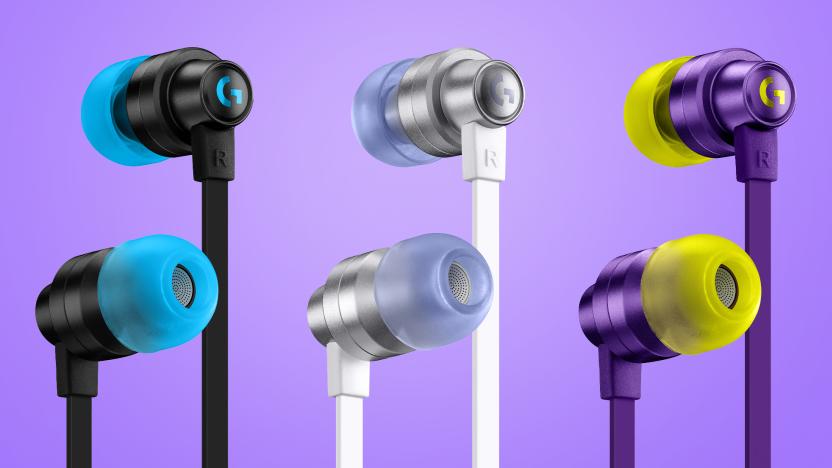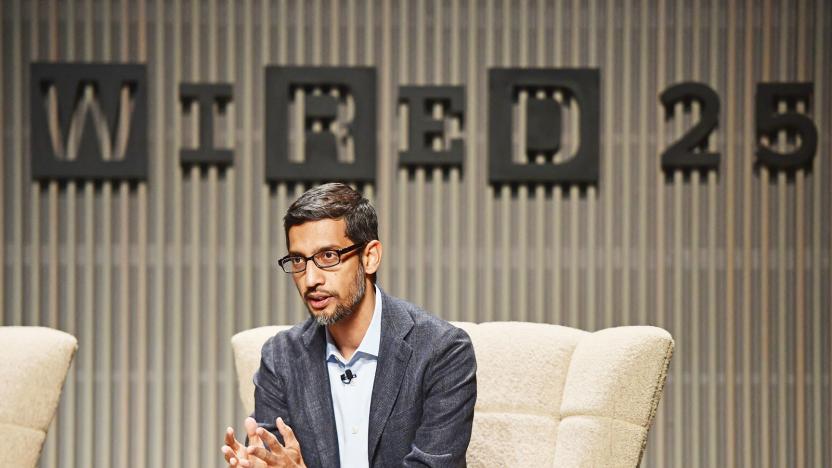Wired
Latest

Ring brings its radar-scanning tech to a floodlight camera
The new floodlight camera lets you see a breadcrumb trail of someone's path to your door.

Logitech's first 'in-ear monitors' for gaming cost $50
Logitech's G333 are the company's first in-ear headphones for gaming.

Google CEO Sundar Pichai confirms censored China search engine
When Google's chief privacy officer admitted to the Senate that the company is working on a secret project called 'Dragonfly,' he refused to say what it is. According to previous reports, Dragonfly is the codename for the censored search engine Google has been developing for China since 2017 -- a search engine that can automatically identify websites banned by the country's infamous firewall and can remove them from the results page. Now, Google chief Sundar Pichai has openly confirmed the search engine's existence at the Wired 25 Summit and even told the audience that its development is going very well.

Marshall's latest headphones pack improved audio in a familiar design
Marshall's Major headphones first debuted in 2010, and the company introduced the wireless Major II in 2016. Now Marshall is updating its most popular model with the Major III: a redesigned version of the on-ear headphones that still carries that familiar style. While this new option may look similar to the others, there are some updates that should make the extremely capable headphones even better.

The enduring myth of the hacker boy-band
Last week, Wired magazine published a sprawling feature on a group of young hackers the magazine claimed would "make us or break us" with their "exceptional talent." The article fawningly profiled each member of a group of Northeastern University college students who would "soon dominate technology -- and shape our future."

How artificial intelligence can be corrupted to repress free speech
The internet was supposed to become an overwhelming democratizing force against illiberal administrations. It didn't. It was supposed to open repressed citizens' eyes, expose them to new democratic ideals and help them rise up against their authoritarian governments in declaring their basic human rights. It hasn't. It was supposed to be inherently resistant to centralized control. It isn't.

Interpol is using AI to hunt down child predators online
The FBI may have scored a big win with operation Playpen, which helped dismantle a ring of TOR-based pedophiles and prosecute its members (thanks, Rule 41), but that was just one battle in the ongoing war against the sexual exploitation of children. That fight is now a bit easier for European law enforcement, which as debuted a new machine learning AI system that hunts for child porn on P2P networks.

Recommended Reading: The political media machine on Facebook
Inside Facebook's (Totally Insane, Unintentionally Gigantic, Hyperpartisan) Political-Media Machine John Herrman, The New York Times Magazine A barrage of political links, ads and other content has filled up your News Feed over the last few months. With each new election, the amount of noise seems to get worse and now that we have two candidates who both have quite a list of shortcomings, the chatter is at an all-time high. The New York Times Magazine takes a deep dive into how Facebook is serving as a massive political media machine and its influence on democracy in the US.

Wired thinks it knows who founded Bitcoin
The person responsible for creating Bitcoin remains a mystery, though Wired is convinced it's a 44-year-old Australian man named Craig Steven Wright. The founder is commonly referred to as Satoshi Nakamoto, though that name appears to be a pseudonym. Wired's assertion comes after it sifted through a trove of emails, transcripts and since-deleted blog posts largely provided to the site by dark-web analyst Gwern Branwen.

Google's codebase is ludicrously huge for good reason
Google's codebase -- the programming instructions that run every one of its services from Gmail to Slides -- span a whopping 2 billion lines of code that stretch across 1 billion files and require 86 terabytes of storage, according to Google engineering manager Rachel Potvin. She recently disclosed those figures at the @Scale engineering conference. She also noted that this massive collection of data is mirrored and continually updated in ten data centers peppered around the globe. "Not only is the size of the repository increasing," Potvin explained during her lecture, "but the rate of change is also increasing. This is an exponential curve."

Stephen Hawking is hosting a week-long Q&A on Reddit next week
Have a question for one of the smartest men on the planet? Mark your calendar: on Monday July 27th at 8am ET, Stephen Hawking will be taking questions from the public in his first ever Reddit AMA (Ask Me Anything). If you can't make it Monday, don't worry about it, he'll be answering questions for over a week -- a first for the forum's Q&A community.

Join us for the Macworld/iWorld 2014 State of Apple Technology panel liveblog
When it rains, it pours. Sure enough, it has been raining here in drought-stricken Northern California, so much so that numerous flights were delayed coming into the city yesterday. And after a drought of Apple-related liveblogs, we actually have two that will be happening simultaneously. Mike Rose will be covering Microsoft's announcement today at 10 AM PT/1 PM ET, where we expect to hear about an iPad version of Microsoft's Office suite. At the same time and just a few blocks away, we will be liveblogging the "keynote" of this year's top Apple fan event -- Macworld/iWorld 2014 -- which is a panel discussion on The State of Apple Technology. Longtime Mac writer Jason Snell (Senior VP, editorial director, IDG Consumer & SMB) will moderate the discussion and is joined by Ben Bajarin (Principal, Creative Strategies, Inc.), Christina Bonnington (Staff Writer, Wired), Rene Ritchie (Editor in chief, iMore), and former TUAW blogger Christina Warren (Senior Tech Analyst, Mashable). So choose your liveblog wisely. Even better, open up two tabs in your favorite web browser and flip between the two liveblogs. It should be quite fascinating!

BroApp coming to iOS amidst firestorm of opinion
BroApp, a US$1.99 Android app that sends automated texts to friends, partners, and family is heading soon to iOS. The app acts on your behalf as a kind of techno-Cyrano. It messages your recipient with a fortune cookie of attention. "Thinking of you." "Can't wait to see you." "Good morning! I hope you have a great day!". It's also smart enough to disable itself when it's near a target's Wi-Fi network by detecting SSIDs. The website advertises that the product "messages your girlfriend sweet things so you can spend more time with the Bros" (hence the name). And, already, Wired has taken a stance suggesting that some apps may turn us into sociopaths. Me? I disagree. We already live in a Hallmark age. A pre-printed sentiment is now de rigueur for nearly every holiday and life event. If you inadvertently skip these plastic emotions, the social sanction can be be harsh. BroApp is no more unrealistic than the over-the-top sentimentality we witness on Valentine's Day, Mother's Day, and New Years. BroApp isn't creating a pathology. It just reflects the reality of one that already exists.

Wired's LED-powered Moto X ad lets you try custom colors before you buy
Designing compelling interactive ads for web is hardly a challenge for experienced marketers, but engaging print magazine readers in a similar way requires significant creativity. One method is through technology -- Esquire stood out at newsstands with its attention-grabbing E Ink cover in October 2008, and Forbes turned some heads with a Microsoft ad earlier this year that integrated a functioning T-Mobile WiFi hotspot -- but Wired's January 2014 issue shall not go without mention, thanks in no small part to a partnership with Motorola. A trio of LEDs, a slab of plexiglass, four batteries and an array of buttons make up an interactive Moto X ad, right in the middle of the magazine. The design enables readers to "customize" a Moto X's rear, with bright LEDs illuminating the phone in 11 different colors. Tap blue and the phone lights up blue, yellow and it's yellow, red for red, and so on. The ad shuts off after a few seconds of inactivity, so those four lithium batteries should last you for quite some time, serving as a reminder of Moto's accomplishment long after the smartphone is laid to rest, while boosting this issue's appeal for collectors as well. Digitas, the advertising agency tasked with creating the ad over the last six months, says 150,000 copies of Wired in New York and Chicago will include the interactive advertisement. It's available on newsstands in those cities as well, so you should be able to get your hands on one even if you're not a subscriber. It's a costly endeavor, no doubt, but if today's publicity is any indication, it should pay off. Take a closer look in our hands-on (and teardown) video, embedded after the break.

Apparently Apple isn't 'thriving' enough for some people
Yesterday, Google co-founder and CEO Larry Page let investors know that he wouldn't be able to attend every single earnings call as he has made a habit of in the past. Some speculated that it's because of an increasingly difficult medical condition that makes it hard for Page to speak. Regardless, none of this would normally make me raise an eyebrow until I saw this headline on Wired. Note: The original title of the Wired article linked above was "Google Without Larry Page Would Still Thrive - Unlike Apple Without Steve Jobs" but it has since been changed (without explanation) to "Google Without Larry Page Would Not Be Like Apple Without Steve Jobs" The premise of the article is that since Google's stock rose in the wake of Page's announcement, the company is better suited to life without its longtime CEO than Apple was (or "is," I suppose). The author assumes a lot here, using "likely" and "even if" to push his arguments into a fictional world where they're automatically correct. My biggest issue with the article as a whole is the fact that we're comparing apples and oranges -- and that's just when it comes to Jobs and Page. If we add their corresponding companies, we're comparing caramel-covered apples and vodka-infused oranges. Jobs stepping down from his post as the most visible person in the company and then dying is not equal to Larry Page -- who, as the article notes, is more of a behind-the-scenes CEO -- telling investors he can't make every earnings call from now on. Acting as though the two events are even in the same ballpark in terms of relevancy is irresponsible. Then there's the general tone that permeates the rest of the piece regarding Apple's supposed downfall, and in particular the insinuation in the title that Apple without Jobs is not thriving. Here's a quick list of things that have happened since Jobs left Apple for the last time: The third-gen iPad became the fastest-selling iPad The iPhone 5 became the fastest-selling iPhone The fourth-gen iPad and iPad mini combined to sell 3 million units in three days, another new record iTunes sold its 25 billionth song The 50 billionth app was downloaded from the App Store Apple has been named the most valuable brand in the world, dethroning Coca-Cola for the first time in 13 years The iPhone 5s and 5c combined to sell 9 million units in three days, another record The iPhone 5s took the title of the fastest-selling iPhone from the iPhone 5 But hey, Wall Street is wringing its hands over whether or not Tim Cook can run a successful company (which, at this point, isn't even a question), so of course Apple must be doomed. What's that? You mean Apple's stock right now is higher than it ever was under Jobs? Huh. I guess some people have a different definition of "thriving" than the rest of us. We'll ignore the fact that investors have been wrong about Apple so many times, it's pointless even bringing them into the discussion, because that blows the original argument out of the water. Wired's piece isn't an isolated incident, and there have been "Apple isn't what it used to be" opinion pieces popping up for the past two years now. I realize that taking the time to write this rebuttal probably won't change much (or, let's be honest, anything), but the beauty of all of this is that it doesn't matter. As I've said before, Apple's been "doomed" for a while, but that's never stopped them from selling their products in record numbers and embarrassing the competition at nearly every turn. [Image credit: GDS-Productions]

Wired and the design behind the iOS 7
On the heels of its iOS 7 coverage, Wired has taken the time to dive into the story about how the overhaul to Apple's iOS platform came to be. Instead of retreading the old route from Scott Forstall to Jony Ive, the magazine explores the psychological justification of skeuomorphism and how modern design, such as what Ive and Steve Jobs embraced, came to be. It looks at how Apple needs to go beyond getting people used to the idea of a smartphones and touchscreens and head to the next level of design and interactivity. It's no longer showing off what your phone can do for you, but encouraging you to do more with your phone.

Logitech unveils $60 wired iPad keyboard built for classroom abuse
Bluetooth keyboards for the iPad are nice and all, but aren't you going to need to be within a wire's-length to see the thing anyway? To that end, Logitech has announced a full-sized wired iPad keyboard targeted to classrooms with an emphasis on durability and maintenance. It has a spill-resistant design, three-year warranty and key life of over 5 million strokes, according to the company, and comes in either lightning or 30-pin versions. If you don't mind being tethered, the Lightning model will ship in August and the last-gen iPad model in November for $60 each -- but you can pre-order now at the source.

The rising popularity of iPad as cash register
Over at Wired, writer Marcus Wohlson points out that the novelty of using an iPad or other mobile device as a cash register is beginning to disappear as that particular use case turns mainstream. The act of handing your credit card to an iPad-toting store clerk or coffee shop barista was unthinkable a few years ago and increasingly the norm in 2013. Wohlson brings up a recent study by UK industry firm Timetric that notes that between 2011 and 2012, the number of mobile point-of-sale systems used worldwide more than doubled. While Timetric's researchers don't believe that the rate of uptake will be as high in the future, it is expected that the percentage of checkout counters using such system will increase from about one in five last year to almost half by 2017. Wohlson posits that the popularity of some systems may put a damper on the use of near field communication (NFC) for payment systems in the future since the omnipresent iPad-mounted card reader makes continued use of traditional credit and debit cards more likely. The ability to use smartphones for multiple purposes and their ubiquity in pockets and purses around the world might some day make a cashless, cardless society a reality, but for the foreseeable future the plastic card being swiped at an iPad cash register seems much more realistic.

Auto manufacturers slow to adopt Siri Eyes Free
Remember the hoopla at last year's WWDC when Apple announced Siri Eyes Free? The feature was designed to use a car's onboard voice-recognition hardware to process voice input and pass it along to Apple's Siri. At this point in time, according to an article on Wired, only GM has actually implemented the feature and two others have disclosed plans to offer Siri Eyes Free. GM made Siri Eyes Free available on the entry-level Sonic and Spark vehicles through the MyLink infotainment system, which uses the iPhone to supply just about all the content available -- music, navigation and communications. But two low-end vehicles from one manufacturer don't spell success for Siri Eyes Free. Fortunately, Honda is planning on adding the feature to new vehicles by this summer, and Mercedes-Benz will add Siri Eyes Free integration with an add-on accessory called the Drive Kit Plus for iPhone within a week. Wired's Doug Newcomb notes that the issue isn't with the technology, but rather with the long product lead times with auto manufacturers and difficulties in making changes to production vehicles. That's not to say that it's easy to integrate Siri with a car; Steve Witt of Dice is quoted as saying "When you have two competing [voice recognition] systems, I don't believe it's going to be seamless." Dice was testing Siri Eyes Free with an onboard voice recognition system and said, "The car's radio gets confused." Still, with the long lead times to get integration into a car infotainment system -- often four to five years -- it may be a while before Siri Eyes Free is commonplace in new vehicles.

iPhone, macro lens take beautiful snowflake photos
Sometimes photography is all about capturing the moment quickly and not the expensive camera equipment you tote around in your bag. Wired has an excellent story about Ben Woodworth, who used an iPhone 5 and a $5 macro lens attachment to capture a series of stunning snowflake portraits. He locked the focus on his iPhone and steadied it by leaning on a backpack before he snapped the photos. You can see one example shot above and hop over to Wired to see the rest.













